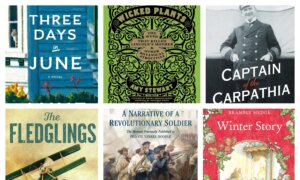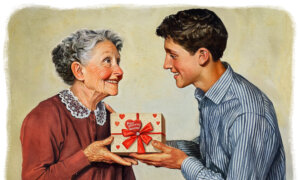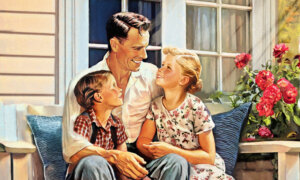Search online for “the man in the arena,” and you’ll find dozens of sites, along with posters and wall plaques, referencing two sentences, one of them quite long, taken from a speech delivered in 1910 by Theodore Roosevelt at the Sorbonne. This passage, with its dramatic metaphor about the man “whose face is marred by dust and sweat and blood ... who spends himself in a worthy cause,” has rightly captured the attention of journalists and bloggers.
“Citizenship in a Republic,” as Roosevelt titled his address, is nearly 9,000 words in length and still worthy of our attention today. Tucked into this long parade of the former president’s thoughts are some passing comments on a “sound mind” in a “sound body” and on the element never included in this prescription for well-being: a sound character.
‘There Is Need of a Sound Body’
So said Roosevelt in his Sorbonne address, and he had lived the truth of those words. As a boy, he was weak and sickly, stricken frequently with severe asthma. When these attacks were especially bad, his father, Theodore Senior, would take him on carriage rides to try and soothe his labored breathing with fresh air. As Roosevelt ripened into adolescence, his father one day charged him with a mission that changed his life: “You have the mind but you have not the body. You must make your body.”
Equipped with a home gym provided by Roosevelt Sr., “Teedie,” as he was known to his family, set out to do just that. He established a regimen of exercise, which included lifting weights and learning to box and wrestle. Entering Harvard at 16, he continued his conditioning program, and for decades afterwards looked for ways to keep physically fit. He held his own against the cowboys he met during his Western years, fought in Cuba in the Spanish-American War, and was known even in his presidency as a man of unusual vigor. “I believe in exercise for the body,” he said to his distinguished audience in Paris, “always provided that we keep in mind that physical development is a means and not an end.”
The Life of the Mind
During his speech in Paris, Roosevelt also touched on the importance of intellect and education. Here, too, we can map out the course of his own development. Before entering Harvard, he was homeschooled by his mother, his aunt, and several tutors. In his
autobiography, he relates the advantages bestowed by two pre-college trips abroad. On the second excursion, he and his family visited Egypt, Syria, the Holy Land, and parts of Europe, all of which broadened his knowledge of the world.
The autobiography reveals Roosevelt’s lifelong predilection for reading. He always had a book going, and often polished one off in a single day’s time. The scope of that reading was wide, from history to the natural sciences, and Roosevelt possessed the ability to retain much of what he’d consumed, making him one of the greatest bibliophiles to occupy the White House.
Important as fitness of body and mind were, however, Roosevelt explained to his distinguished listeners that “these stand second to certain other things.”
First and Foremost Is Character
“There is need of a sound body,” Roosevelt told them, “and even more of a sound mind. But above mind and above body stands character—the sum of those qualities which we mean when we speak of a man’s force and courage, of his good faith and sense of honor.”
In making his case, Roosevelt touched on those negative examples of human beings who are weak or lacking in character altogether: the cynic who faces life “with a sneer”; the idler, rich or poor, who doesn’t “earn his own livelihood”; the hypocrite who advocates morality while failing to practice it; the man who piles up a fortune “for the acquisition or retention of which he returns no corresponding benefit to the nation as a whole”; the journalists whose “mendacity, slander, sensationalism, inanity, vapid triviality, all are potent factors for the debauchery of the public mind and conscience.”
By this time, Roosevelt would have encountered plenty of people who fit this bill, particularly the corrupt cops he fired when he was a New York City police commissioner and the waffling politicians in Albany and Washington D.C. He also warned his audience about another phenomenon as prevalent then as it is now: the obeisance paid to self-styled “experts” and academics, whom he dubs “the closet philosopher, the refined and cultured individual who from his library tells how men ought to be governed under ideal conditions.”
Life Is the Forge of Character
Though he doesn’t say so directly in his “Man in the Arena” lecture, Roosevelt would have surely recognized that numerous preceptors and experiences helped shape his own sense of integrity and honor. The books about heroes he read as a child, the warmth, guidance, and love of his mother and father, of whom he said, “My father was the best man I ever knew”; the countless rounds spent in a boxing ring; the hardships he encountered during his ranching days in North Dakota’s Badlands—on and on goes the list.
This mix of personal experience with wisdom gained from others is the furnace that forges character. That fire usually burns steady and low, but sometimes the heat of those flames can become almost unbearable. At 3 a.m. on Valentine’s Day, 1884, Roosevelt’s mother, Mittie, died of typhoid fever, and less than 12 hours later, in the same house, his beloved first wife, Alice, succumbed to Bright’s disease after giving birth to a baby girl two days earlier.
What eventually carried the 25-year-old Roosevelt through this catastrophe was not his Harvard education nor his physical stamina. It was his character.
We’re All in That Arena
The reality is that, in matters of character, each one of us steps into an arena every day of our lives. Sometimes our situation is dire, dealing with the death of a loved one, a lost job, the betrayal of a friend or even of our own principles. Sometimes, this arena can strain our endurance to the max, as when dealing with a colicky baby or bailing a teenage son out of jail in the middle of the night for some foolishness he’s committed.
Most of the time, however, being in the arena means maintaining the standards of our character as we go through our daily duties and routines, abiding by what Roosevelt calls “the commonplace, every-day qualities and virtues.”
At one point, Roosevelt told his audience, “Self-restraint, self-mastery, common sense, the power of accepting individual responsibility and yet of acting in conjunction with others, courage and resolution—these are the qualities which mark a masterful people.”
And these are also the qualities of character that bring triump—though not always victory—in the arena.









